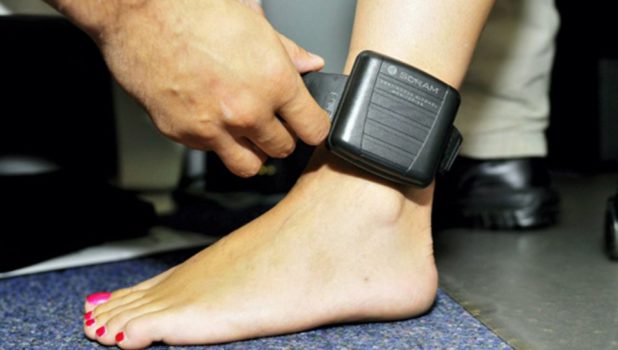Some people think that the idea that the government wants to implant microchips in people is a conspiracy theory, even though the government is openly discussing the use of tracking bracelets that would serve exactly the same purpose as the microchips.
Governments and businesses are looking into forcing everyone to wear tracking devices, under the pretense of keeping people safe from a virus that we know is only as dangerous as the flu.
They’re first going to try to make the devices mandatory in the workplace, and if no one pushes back, they’re going to try to make them mandatory in order for people to be allowed to go outside their homes and have a social life, arguing that there’s no difference between the workplace, the streets, gyms, clubs, and anywhere else.
You’d best start believing in Mark of The Beast agendas.
Surveillance firms around the world are licking their lips at a once-in-a-lifetime opportunity to cash in on the coronavirus by repositioning one of their most invasive products: the tracking bracelet.
Body monitors are associated with criminality and guilt in the popular imagination, the accessories of Wall Street crooks under house arrest and menace-to-society parolees. Unlike smartphones, de facto tracking devices in their own right, strapped-on trackers are expressly designed to be attached to the body and exist solely to report the user’s whereabouts and interactions to one or more third parties; they don’t play podcasts or tell you how many steps you took that day to sweeten the surveillance.
But a climate of perpetual bio-anxiety has paved the way for broader acceptance of carceral technologies, with a wave of companies trying to sell tracking accessories to business owners eager to reopen under the aegis of responsible social distancing and to governments hoping to keep a closer eye on people under quarantine.
Take AiRISTA Flow, a Maryland-based outfit that helps corporations track their “assets,” breathing or not. In an April 21 press release, the company announced it would begin selling Bluetooth and Wi-Fi trackers to be worn on an employee’s wrist like a Fitbit — or around their neck like a cowbell. “When people come within six feet of each other for a period of time,” the company wrote in a press release, “the device makes an audible chirp and a record of the contact is made in the AiRISTA Flow software system.” But the tracking goes far beyond audible chirps: AiRISTA’s platform allows employers to continuously upload a record of close encounters to a corporate cloud, providing an up-to-date list of presumed social distancing violators that would double as a detailed record of workplace social interactions.
The company’s marketing language is explicit in talking up the nonviral benefits of tracking your workers’ every move: By helping companies “Locate people and things in real time” (the two are seemingly treated interchangeably), they can expect a “Reduction in unplanned downtime,” “Improved asset utilization rates, [and a] reduced need for spares.”
In a press release published just a day after AiRISTA Flow’s, Boston-based Redpoint Positioning Corporation, another player in the business of tracking workers and inanimate objects, announced that it was taking its own “cutting-edge technology … already used by leading companies worldwide in third-party logistics, auto manufacturing, mine operation” and repackaging it for social distancing. Like AiRISTA, Redpoint offers companies the ability to “tag” their equipment and employees using ultra-wideband radio signals, a wireless positioning technology only recently added to the most advanced iPhones. Redpoint boasted in the announcement of its ability to use these tags to “track the location of people and equipment with extremely high accuracy, even in complex industrial environments,” now with a coronavirus-specific augmentation: “If social distancing parameters, such as a 1- or 2-meter radius, are violated between workers, the tag alarm will alert them to the hazard.” The company will also collect a history of employee interactions: “If an infection does occur, historical data from the system will allow for highly accurate contact tracing, as records can show the individuals who were near the infected party.”
…
While the AiRISTA and Redpoint trackers merely evoke the aesthetics of a police state in the workplace, Israeli surveillance outfit SuperCom is literally repackaging as a Covid-19 “solution” technology previously used on incarcerated or criminally convicted people. The security company has customers in 20 countries, including the U.S., and claims decades of experience with what it calls in a press release “secured boundaries projects,” like border crossings and home confinement. It’s the house arrest expertise that the company is now marketing as PureCare, described on the SuperCom website as a “state-of-the-art solution for quarantine and isolation monitoring to aid government efforts in containing and limiting the reach of infectious diseases” and, incredibly, as “a non-intrusive patient friendly system that constantly tracks patient location within buildings, vehicles and outside.”
SuperCom Americas President Ordan Trabelsi declined to tell The Intercept where the company’s ankle bracelets are currently being used for quarantine enforcement, but it named Central America as the location of one pilot deployment, and referenced a second pilot program in some other, unspecified region, in an April 6 press release announcing a “Coronavirus (COVID-19) citizen quarantine and containment tracking technology.” The company announced separately, on April 27, that it had begun selling tracking devices for prisoners released from an unnamed “United States of America correctional facility due to COVID-19.”
In the same press release, SuperCom claimed to see a spike in interest from “government agencies looking to restrict the spread of COVID-19 among their general population” and envisioned “additional potential industry demand for electronic monitoring services coming from the incarcerated American population.”
…
In an interview with The Intercept, Trabelsi said interest in SuperCom’s coronavirus product has been “mostly government” so far. Should any of these intrigued governments decide to use SuperCom bracelets to enforce quarantines, Trabelsi said it’s up to them to do so responsibly. “Everyone has their own rules,” he told me. “Some countries share that they want to put everyone who comes into the country into quarantine for 14 days, some want to put it onto people who are sick, or who have a confirmed case; it depends what [that government’s] regulations are. They define the rules exactly as they want. We just provide them with technology to track people.”
Coronavirus is just an excuse. Experts not employed by the government, and even a Nobel laureate, have disavowed the virus hysteria and lockdown lifestyle. All data points to the virus being about as dangerous as the flu.
The only things that government people are using to excuse their lunatic actions are made up graphs, projections, and estimations that proved to be wrong.
All of these social distancing measures, the house arrest lifestyle, and the promotion and encouragement of germophobia, are the tools that the rulers are using to push their total control agenda with impunity. Coronavirus has proven to be their best tool to date. They’ve set up a situation where anyone in opposition to what they claim is being done to keep people safe can be effectively labeled a dangerous individual who is putting people’s lives at risk.
They are going to keep pushing. It doesn’t matter if people believe in their evil agenda or not. They believe in it.
 Daily Stormer The Most Censored Publication in History
Daily Stormer The Most Censored Publication in History




